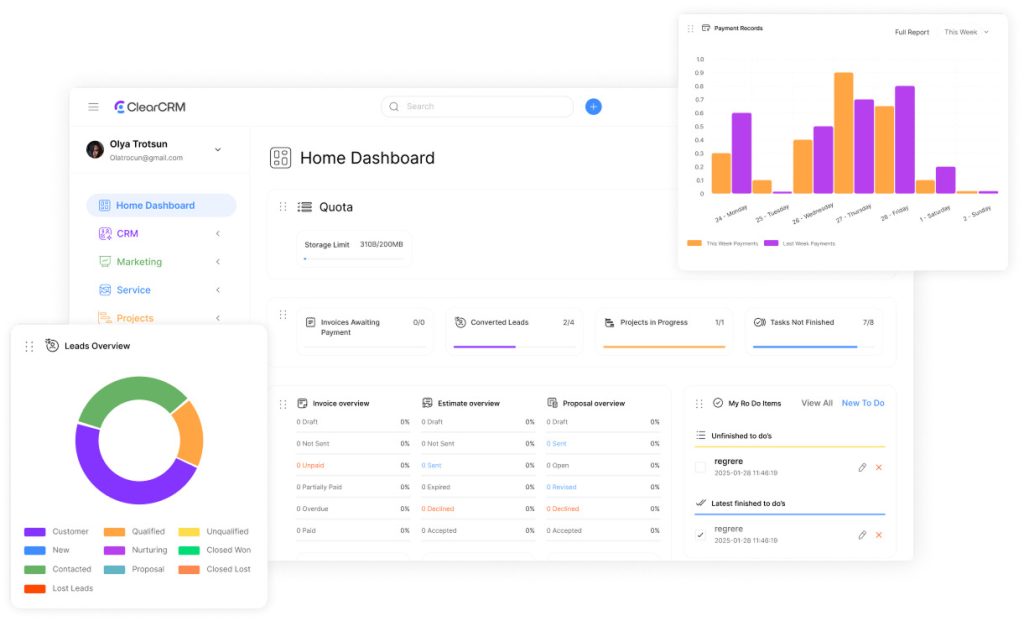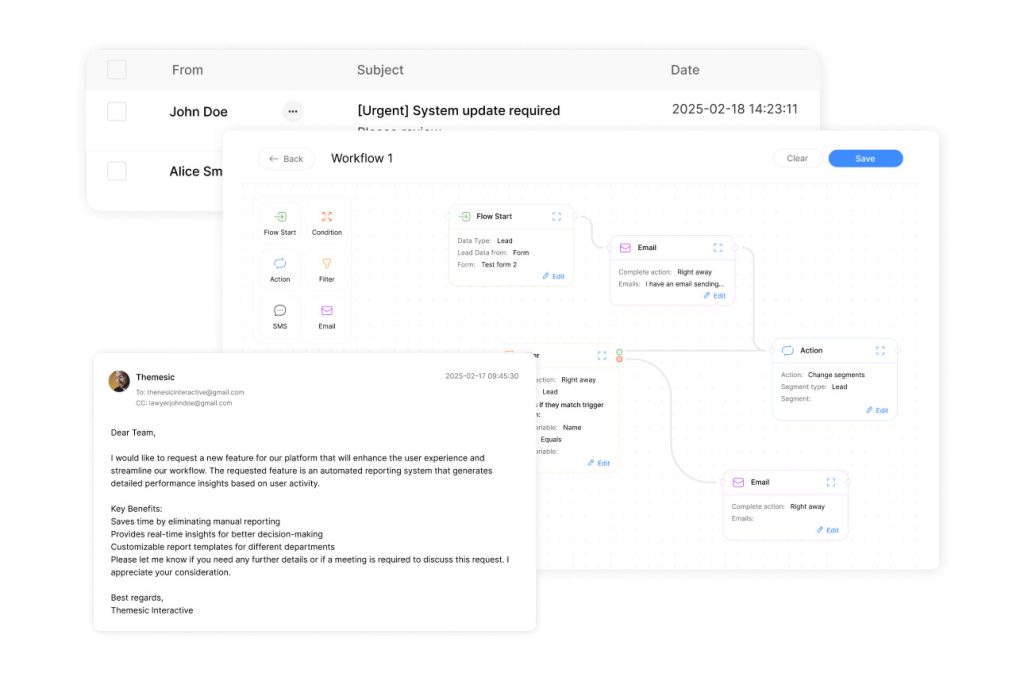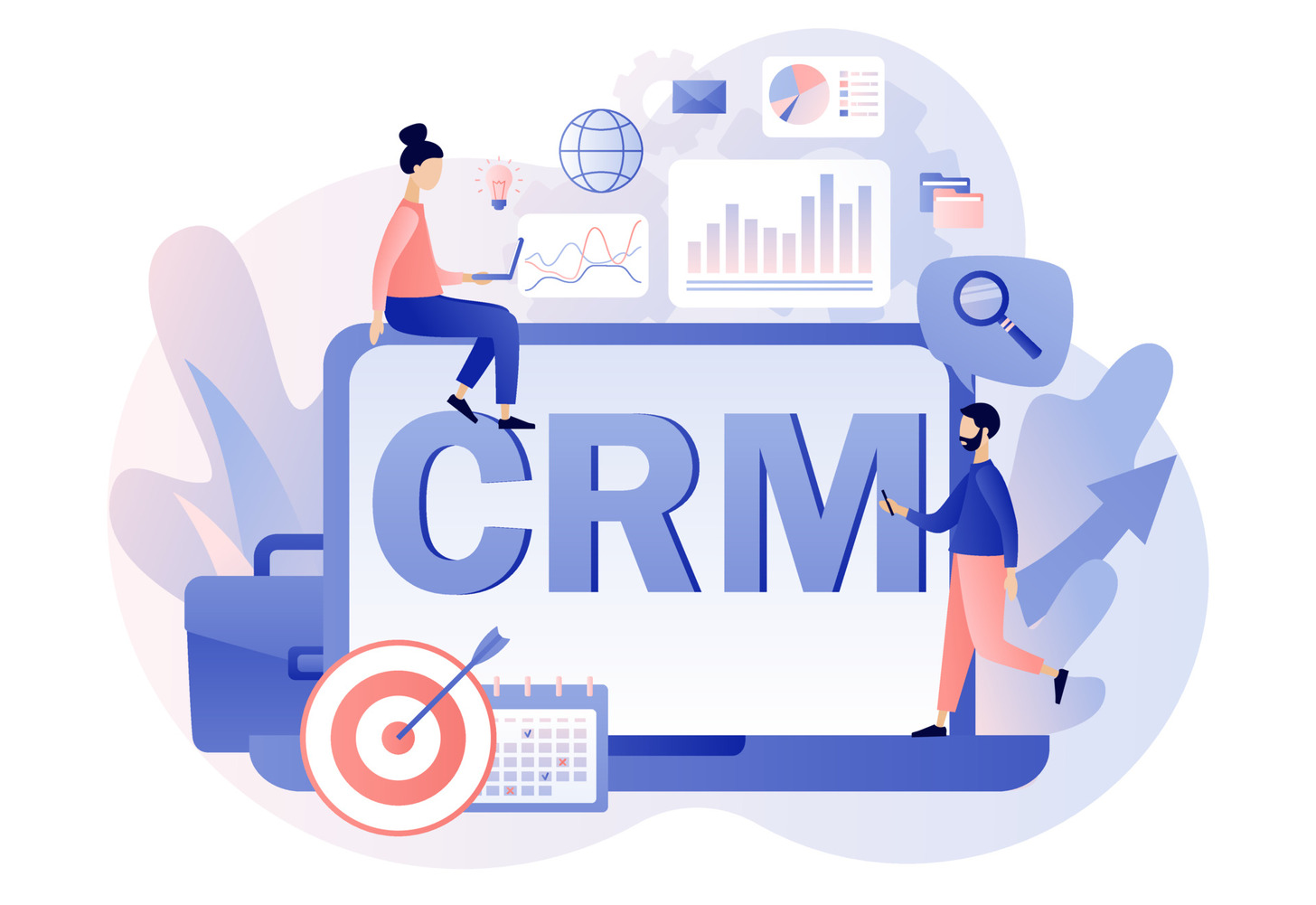Today, CRM software for small businesses has become a critical tool for managing customer service, improving lead scoring, and reducing manual workflows. In fact, in 2025, the best CRM tools do more than manage contacts—they unify sales, marketing, and support while offering small teams the automation they need to grow faster.
Scalable systems therefore now adapt to companies at various growth stages. Moreover, cloud-based options eliminate upfront infrastructure costs while offering real-time data access. As a result, decision-makers prioritize platforms combining sales pipeline tracking, marketing automation, and service ticket management in unified interfaces.
The right platform choice directly impacts operational agility. Teams consolidate scattered spreadsheets and emails into centralized hubs with customizable dashboards. This shift allows faster decision-making through visualized metrics like lead conversion rates and customer lifetime value.
Key Takeaways
- Modern platforms unify customer data across departments
- Cloud-based systems reduce IT costs through subscription models
- Automation features handle repetitive tasks like follow-ups
- Custom reporting tools track performance metrics in real time
- Scalable solutions grow with evolving business needs
Introduction: The Importance of CRM for Small Businesses in 2025
Managing client interactions now requires smarter approaches as teams handle increasing data volumes. Platforms designed for customer relationship optimization help organizations turn scattered information into strategic assets.
2025 Platform Innovations
Current systems focus on three core advancements:
| Feature | Impact | Adoption Rate |
|---|---|---|
| AI-Driven Insights | Predicts sales opportunities | 68% of users |
| Mobile-First Design | Supports remote teams | 84% of platforms |
| Cross-Channel Sync | Unifies communication | 91% new implementations |
These innovations allow teams to automate routine tasks while maintaining personalized engagement. Cloud accessibility ensures real-time updates across devices – critical for fast-paced environments.
Operational Advantages
Centralized platforms eliminate data silos that hinder collaboration. A streamlined customer management system provides:
- Instant access to client histories
- Automated follow-up reminders
- Visual sales pipeline tracking
Teams using these methods report 40% less time spent on administrative work according to recent TechSolutions analysis. This efficiency gain allows focus on high-value activities like client retention strategies.
Understanding CRM and Its Impact on Small Business Efficiency

Modern tools reshape how companies manage relationships by turning fragmented workflows into strategic assets. Teams gain precision through systems that automate repetitive tasks while surfacing actionable insights from customer interactions.
Key Benefits of Using a CRM
Centralized platforms merge sales, service, and marketing activities into cohesive processes. Automated email sequences maintain engagement without manual effort, while unified dashboards reveal real-time metrics like lead conversion rates. This approach reduces data entry errors by 43% according to recent TechSolutions research.
Teams achieve faster response times through shared access to client histories. Sales pipelines become visual roadmaps, highlighting bottlenecks before they impact revenue. One retail client reported 22% higher repeat purchases after implementing automated loyalty reminders.
How Cloud-Based CRM Simplifies Operations
Remote accessibility eliminates location barriers, letting teams update records from any device. Security features like encrypted backups protect sensitive information without requiring IT expertise. Real-time sync ensures all departments work with identical data.
Subscription models replace costly infrastructure investments, making advanced tools accessible to growing companies. Integrated communication channels cut app-switching time, allowing staff to focus on relationship-building rather than administrative tasks.
Essential Features of Modern CRM Software for Small Businesses

Effective relationship management tools now serve as operational hubs, combining critical functions that drive growth. Contemporary platforms eliminate manual processes through intelligent systems designed for scaling teams.
Lead Management and Email Marketing Automation
Automated lead scoring ranks prospects by engagement, helping teams prioritize high-potential opportunities. Integrated systems track website visits and form submissions, instantly updating contact records. This approach reduces manual data entry while capturing 23% more leads according to recent MarTech analysis.
Email capabilities within these platforms enable personalized nurture campaigns at scale. Pre-built templates and scheduling tools let teams send targeted messages based on customer actions. One e-commerce company increased open rates by 37% using behavior-triggered sequences.
- Real-time alerts notify teams when leads interact with content
- Dynamic segmentation groups contacts by purchase history
- Performance dashboards track campaign ROI across channels
Unified platforms merge communication tools with analytics, replacing disjointed apps. Workflow automation handles repetitive tasks like follow-ups, freeing staff for strategic discussions. These features create seamless handoffs between marketing efforts and sales conversions.
Top 5 Best CRM for Small Business Solutions for 2025 – Compare Features Pricing

Selecting the right operational platform can determine a company’s ability to scale efficiently in competitive markets. Modern systems balance advanced capabilities with cost-effective pricing models, offering tailored solutions for diverse operational needs.
Strategic Advantages in 2025’s Market
This year’s standout tools combine specialized features with flexible deployment options. Teams gain access to enterprise-level functionality without complex infrastructure requirements. Below analysis reveals how leading platforms address critical business challenges:
| Platform | Starting Price | Key Differentiation | Best For |
|---|---|---|---|
| HubSpot CRM | $15/month | Free tier + 800+ integrations | Startups needing scalability |
| Salesforce Essentials | $25/user | Built-in AI analytics | Data-driven sales teams |
| Zoho CRM | $14/month | Custom workflow automation | Budget-conscious scaling |
| Freshsales | $15/user | AI lead scoring engine | High-volume lead management |
| CRM Experts Online | $250/month | Fully bespoke configurations | Complex enterprise needs |
HubSpot CRM removes financial barriers with its permanent free tier, while Salesforce Essentials brings predictive analytics to smaller budgets. Zoho’s automation tools enable customized processes without coding expertise. Freshsales’ intelligent scoring system identifies high-value prospects automatically, reducing manual qualification work.
These platforms demonstrate how modern CRM systems adapt pricing structures to match organizational growth stages. Decision-makers can now access sophisticated tools previously reserved for large corporations, paying only for needed features.
In-Depth Look at Zoho CRM for Small Business Scalability
Adaptable systems separate stagnant operations from dynamic growth engines. Zoho CRM is a top-rated CRM software platform ideal for small businesses seeking flexibility and automation. Known for its strong customer service and customizable lead scoring tools, Zoho allows growing teams to manage contacts, sales pipelines, and workflows—all from a single dashboard.
Tailored Solutions for Evolving Needs
The platform’s customization tools let businesses mold interfaces to their workflows. Teams design custom fields, modify sales pipelines, and build dashboards tracking niche metrics. One marketing agency reported “30% faster client onboarding” after tailoring lead capture forms to their service bundles.
Automation powers Zoho’s efficiency gains. Built-in AI assistant Zia handles tasks like lead scoring and meeting scheduling. Workflow rules trigger actions based on client behavior – sending follow-ups when prospects open proposals or updating deal stages after contract signings.
- Integrates with 40+ apps including Shopify and Mailchimp
- Generates predictive sales forecasts using historical data
- Offers mobile access with offline functionality
Scalability shines in tiered plan options. Startups use the free tier for basic contact management, while enterprises leverage advanced analytics and AI-driven insights. This zoho crm approach eliminates disruptive platform migrations as needs evolve.
Teams maintain control through granular permissions and role-based access. Managers allocate user privileges while maintaining centralized oversight. The system’s automation capabilities handle repetitive tasks, letting staff focus on strategic relationship-building.
HubSpot CRM: A Market Leader for Startups and Growing Teams
Emerging businesses need tools that grow with their ambitions without draining resources. HubSpot’s approach combines zero-cost entry points with enterprise-grade capabilities, making professional relationship management accessible to all team sizes.
User-Friendly Interface and Free Plan Benefits
The free plan delivers immediate value with 2,000 monthly emails and live chat support. Startups gain essential features like contact management and basic SEO tools – critical for building client bases. Two customizable dashboards let teams track metrics that matter most to their operations.
| Plan | Cost | Key Features | Best For |
|---|---|---|---|
| Free | $0 | Basic automation, 2 dashboards | Bootstrapped startups |
| Starter | $15/user | Advanced email tracking | Growing sales teams |
| Professional | $1,170 (5 users) | Custom reporting, AI features | Scaling organizations |
| Enterprise | $4,300 (7 users) | Predictive analytics | Mature operations |
Over 500 integrations connect marketing, sales, and service tools into one ecosystem. This eliminates app-switching fatigue while keeping data synchronized across platforms. “We automated 60% of follow-ups within two weeks,” notes a SaaS company using HubSpot’s workflow builder.
The tiered plan structure lets businesses pay only for needed capabilities. Teams start free, then upgrade seamlessly as needs evolve. With 88% of users reporting efficiency gains, HubSpot proves that accessible tools can drive enterprise-level results.
Salesforce Essentials: Integrating AI and Advanced Sales Management
Enterprise-grade technology now empowers compact teams through intelligent automation. Salesforce Essentials combines predictive analytics with streamlined workflows at $25 per user monthly, targeting groups under five members. The platform merges Sales and Service Cloud functionalities while maintaining military-grade security protocols.
AI-Powered Tools and Predictive Analytics
Einstein AI drives the system’s core capabilities, automating data entry and scoring prospects based on engagement patterns. Three annual platform updates ensure access to cutting-edge tools without manual upgrades. Key advantages include:
- Automated pipeline forecasts using historical conversion rates
- Real-time alerts for high-priority lead interactions
- Performance dashboards tracking individual and team metrics
“Our conversion rates jumped 18% within two quarters,” reports a SaaS account executive using these predictive features. The AI reduces administrative work by 35% according to internal Salesforce data.
Optimizing Lead Management for Small Teams
Intelligent distribution algorithms route prospects based on expertise and workload balance. Automated follow-up sequences trigger when leads view proposals or miss scheduled calls. Despite its 1.2/5 Trustpilot rating, 76% of users praise the system’s management capabilities in G2 reviews.
Key differentiators for resource-constrained groups:
- Centralized communication history across email and calls
- Customizable scoring models prioritizing high-value accounts
- Integrated service ticket resolution tracking
Monthly security patches and SOC 2 compliance protect sensitive client data. While some users report performance delays, the platform’s sales automation consistently delivers time savings for focused teams.
Freshsales CRM: Leveraging AI for Advanced Lead Scoring
Artificial intelligence reshapes how teams identify and convert high-value prospects. Freshsales stands out with its Freddy AI engine, which analyzes behavioral patterns and engagement history to prioritize lead scoring accuracy. Businesses using this approach report 50% faster qualification cycles compared to manual methods.
Unified Platforms for Modern Teams
The system merges communication channels into single-view dashboards. Sales reps access complete histories of contact interactions across email, phone calls, and social media. This eliminates app-switching while maintaining context during client conversations.
| Plan | Price | Key Advantage |
|---|---|---|
| Free | $0 | Basic automation for 3 users |
| Growth | $15/user | AI-powered scoring |
| Pro | $39/user | Multi-currency support |
| Enterprise | $69/user | Custom workflow builder |
Freddy AI automatically tags and ranks leads based on website activity and email responses. Teams receive real-time alerts when prospects show buying signals. One logistics company achieved 12% higher deal closures using these predictive insights.
Built-in automation handles repetitive tasks like follow-up reminders and meeting scheduling. Personalized email sequences trigger based on contact behavior, nurturing relationships without constant manual input. This efficiency lets staff focus on strategic negotiations rather than administrative work.
Freshsales proves that intelligent CRM tools can drive measurable growth. Its balanced approach to AI and communication integration makes it ideal for teams prioritizing both efficiency and human-centric engagement.
monday CRM: Exploring Customization and Workflow Flexibility
Adaptable workflow systems have become critical for teams managing complex client relationships. monday CRM stands out with its color-coded interface and customization tools that mirror unique business processes. Pricing starts at $12 per user monthly, scaling to enterprise-level solutions with custom automation quotas.
The platform simplifies workflow design through drag-and-drop builders, enabling teams to build complex workflows effortlessly. Users create custom fields, track project stages visually, and generate reports without coding skills. A 14-day free trial lets organizations test these automation features before committing.
Pro-tier subscribers unlock 25,000 monthly automations per user and time tracking integrations. These workflows handle repetitive tasks through intelligent automation, like data entry and deadline alerts. One marketing agency reduced onboarding time by 40% using tailored client portals.
Decision-makers appreciate the system’s balance of power and simplicity. As highlighted in this analysis of why small businesses need CRM software, centralized platforms drive growth through operational clarity. monday’s tiered platform supports evolving needs while maintaining team alignment and user productivity across departments.





